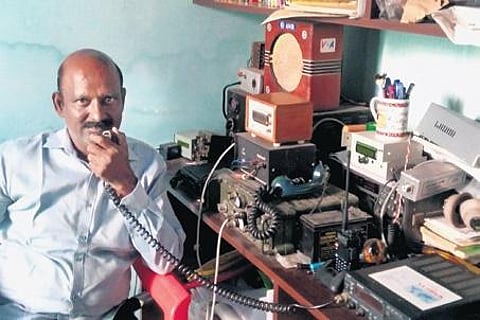

PERAMBALUR: Memories of the 2004 tsunami still flit across minds every now and then. How it disrupted various forms of communication, rendering people helpless to know the whereabouts of their kin. Tension gripped many a family, elders running helter-skelter. Hams, or those with an amateur radio, came to the rescue of both the Tamil Nadu government and the affected people across the state. The individually-operated radio for non-commercial purposes had garnered a base of thousands of users countrywide by the beginning of the 21st century. The operators became silent heroes by connecting the displaced with their families.
V Neelakandan, a farmer from Arumbavur in Veppanthattai block of Perambalur district, was a part of this silent mission. Before he started cultivating maize, cassava, and sugarcane on his three-acre field, Neelakandan planted in himself seeds of technology and electronics from an early age. His grandfather bought a radio in 1962, which became Neelakandan’s first contact with the broadcast box. He transitioned to international radio during his college days before being introduced to amateur radio.
The 56-year-old Mathematics graduate joined the amateur radio club in Salem in 1991 and earned a license to become an operator in 1995. The electronics enthusiast started communicating with other Hams across the world and attributes 500 friends to the radio. He has visited ISRO and Neyvil mines because of the friendships forged. Neelakandan has had a cell phone for 15 years now, but prefers the amateur radio.
“The purposes of the radio are non-commercial exchange of messages, wireless experimentation, self-training, recreation, radiosport, and emergency communications. Through this, we can serve the society by conducting medical, blood donation and accident and help during emergency situations,” he tells TNIE.
During the 1900s, ham radios played an important part in the functioning of pro-independence radio stations in the country. In 2004, ham radio operators embarked on another mission: finding out the whereabouts of those displaced during the tsunami. Neelakandan learned that many people from Kerala were stuck in Andaman and Nicobar Islands, and informed their respective families. He was felicitated by the National Institute of Amateur Radio in Hyderabad for his contribution.
“We do not need to know every language for this,” explains Neelakandan. “Amateur radio has Q codes. Through this, we can talk to people from different states and countries,” he added. Neelakandan has been attending amateur radio seminars held in cities like Mysore, Kanniyakumari, and Kolkata. At these events, equipment needed for ham radios are also sold. “I am the only license holder of amateur radio in Perambalur district,” he says.
He has also been on a drive to keep school students informed about the uses of amateur radio. “Nowadays, people are addicted to mobile phones. They are less interested in amateur radio. They can learn good technology,” he says.